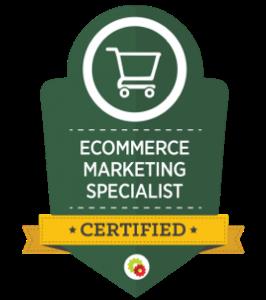
Are you a business owner looking to build a successful ecommerce website?
If so, then SEO should be at the top of your list.
Search engine optimization can make or break an online store – optimizing for search engines is essential for any ecommerce website if you want to stand out from the competition and increase traffic.
This ultimate guide to SEO for ecommerce websites in 2023 will give you insights into how SEO works, what are the best SEO strategies for ecommerce websites, and how to create an effective SEO strategy for ecommerce websites that will help grow your business.
Let’s get started with the burning question, “What is ecommerce SEO?”
What is Ecommerce SEO, & How Does It Work?
Ecommerce SEO is the process of optimizing your online ecommerce store for search engines like Google, Bing, and Yahoo.
This means taking all the necessary steps to make your website appear higher in search results when users search for related keywords.
SEO for ecommerce site involves optimizing your website’s written and visual content, as well as its structure and technical aspects. This makes it easier for search engine robots to crawl, index, and understand your website and ultimately rank it higher in search engine results pages (SERPs).
What does “indexing” mean?
Indexing is like registering your website on Google’s directory or database.
If your website is not indexed, users won’t be able to see it, which means you can’t rank on search engines.

How Does Search Engine Optimization Work?
SEO is a combination of on-page and off-page optimization strategies.
On-Page SEO
On-page optimization involves optimizing elements on your website, such as the design, content, coding, and URL structure.
Some of the basic on-page optimization tasks include:
- Writing keyword-rich website content, titles, and meta descriptions
- Setting up an internal linking structure
- Enhancing page speed and mobile-friendliness
- Optimizing images with alt text
- Using structured data (Schema markup)
- Adding quality external links
All of these factors help search engine robots understand the purpose and content of your website so they can compare it to other ecommerce sites in organic search results.
Off-Page SEO
Off-page optimization, on the other hand, involves activities outside of your website, such as building links from other websites, using social media to promote your content, and submitting your website to directories and webmaster tools like Google Search Console.
These activities all help to increase your website’s visibility and authority in the eyes of search engines.
These on-page and off-page factors are generally known as ranking factors in technical SEO language.

But what exactly is the purpose of ecommerce SEO besides boosting search engine rankings?
Let’s have a quick rundown of the benefits of SEO for ecommerce website.
Benefits of An Ecommerce SEO Campaign
SEO for ecommerce site is essential because of the following:
1. Boost In Website Traffic & Search Visibility
One of the most obvious benefits of ecommerce SEO is that it increases the visibility of your ecommerce site and promises better engagement chances with potential customers.
Doing so builds your digital presence, drives more traffic, and increases customer conversion rates.
2. Minimize Paid Ad Costs
Investing in your ecommerce SEO campaign could mean a significant reduction in your paid advertising budget.
But, thankfully, it would still offer a higher ROI.
Why? and HOW?
Because “53.3% of all organic traffic comes from organic search.” (Source = Ahrefs)
This means more than half of the users ignore paid ads and click on organic search results.

Become A Certified E-Commerce Marketing Master
The Industry’s Most Comprehensive E-Commerce Marketing Certification For The Modern Marketer. Turn Products Into Profit, Browsers Into Buyers, & Past Purchasers Into Life-Long Customers.
So, cut your paid marketing costs, and double down your investment in SEO tools.
3. Enhance Brand Image
Customers are likely to trust and buy from top stores on search engine results pages simply because they are seen more often.
4. Sit Above Your Competition (Literally)
Ranking higher in search engine results not only puts you above competitor ecommerce sites on Google, but it also gives you the edge when it comes to capturing leads.
The higher your website appears in the SERPs, the more likely customers are to click through to it and make a purchase.
5. Improve Your Retargeting Campaigns
Retargeting campaigns involve targeting previous website visitors with personalized ads in order to remind them about your products and win back potential customers.
SEO can help you with this by providing you with data that lets you know how many people are visiting your website and which pages they’re viewing.
This data will allow you to better determine the right retargeting campaigns and optimize them for maximum ROI.
6. Better Usability & Customer Experience
Good ecommerce SEO practices mean that your website is optimized for usability, which in turn enhances the customer experience and makes it easier for visitors to find what they’re looking for.
This can lead to more satisfied customers and higher conversion rates, making SEO a great investment.

All in all, ecommerce SEO is one of the smartest investments you can make for your online store. It doesn’t just help you to rank higher in search engine results; it also helps you grow in every aspect and emerge as a trusted brand.
Now that we’ve covered the working and benefits of ecommerce SEO, it’s time to dive into the ecommerce SEO best practices you should be using.
12-Step Proven & Effective Ecommerce SEO Strategy (+1 Bonus Step)
Here is what a comprehensive ecommerce SEO strategy should include:
1. Registering Your Ecommerce Site On Search Engines
The very first step to kick off your ecommerce SEO campaign is to submit your website on Google, Bing, and other search engines.
Why?
Registering your website with search engines will ensure that your website is visible to search engine spiders and crawled more frequently.
Moreover, it will send you notifications about any technical issues related to crawling or website usability in general.
How to register your website with search engines?
By adding your website’s URL to the respective search engine’s webmaster tools.
For Google, it’s Google Search Console, and for Bing, it’s Bing Webmaster Tools.
2. Setting Up & Optimizing Your Website Structure
Optimizing your site architecture is one of the key ecommerce SEO tools to benefit from. A well-organized and structured website tells search engines that your ecommerce site is easy to crawl and index.

Moreover, a well-structured website appeals to customers and helps them find the information they are looking for quickly and easily.
So, you need to optimize your website structure for both.
How to optimize ecommerce site architecture for search engine bots?
It’s easy. Simply add your sitemap file to Google and Bing using the respective webmaster tools.
A sitemap is basically a visual representation of all the pages on your website that you want search engines to crawl. This should essentially include all of your product pages, category pages, blog posts, and other content.
What does a sitemap do?
It helps search engine bots crawl and index all the pages of your website. Plus, it also helps users see how your website is organized and where they can easily find the information they’re looking for.
You can create a sitemap yourself or take advantage of automated solutions such as Google’s Webmaster Tools. XML and HTML are both used for sitemaps, but HTML sitemaps are a user-friendly option.
How to optimize ecommerce site architecture for website visitors?
Besides adding a sitemap, make sure that all major pages of your ecommerce store aren’t far away from the homepage.
Users like it when a product or category page is easily accessible within three clicks from the home page, as this lets them navigate your website easily.
So, have a clear navigation system with well-defined categories and properly labeled product pages. But avoid adding unnecessary layers of pages; it could make customers feel lost.

Also, add an easy-to-spot search bar somewhere on the page (preferably in the header area). This will allow customers to quickly search and find what they’re looking for on your website.
Bonus Tip: Want to build more trust with your visitors?
Add an About Us and a Contact Us page so customers know who you are as a brand and where they can reach you.
3. Performing In-Depth Keyword Research
The next step to setting up an effective ecommerce SEO strategy is keyword research.
Why?
Because keywords are the foundation of any successful search engine optimization campaign.
They help you understand what people are searching for when they look up something related to your business and the products you offer.
So, how do you find keywords?
Two of the most effective methods are:
Use a Keyword Research tool:
There are plenty of free and paid keyword research tools available online. Ubersuggest, Answer the Public, and Ahrefs Keywords Explorer are some of the popular ones.

Become A Certified E-Commerce Marketing Master
The Industry’s Most Comprehensive E-Commerce Marketing Certification For The Modern Marketer. Turn Products Into Profit, Browsers Into Buyers, & Past Purchasers Into Life-Long Customers.
These tools will provide you with a list of keyword suggestions related to your business and products, their search volumes, CPCs, keyword difficulty scores, and more.
Or, you can use a free tool like Google Keyword Planner. It’s a great way to find relevant and popular keywords for your website.
Bonus Tip: You can use the auto suggest feature on Amazon, Etsy, and other platforms to find more relevant keywords.
Google’s Autosuggest:
Another easy way to find keyword ideas is through Google’s auto suggest feature. All you have to do is type a keyword into the search box, and Google will automatically suggest related terms.
For example, if you type ‘running shoes,’ it’ll give you a list of related keywords such as ‘best running shoes,’ ‘running shoes for women,’ and so on.
These keyword suggestions will give you a better idea of what people are searching for, allowing you to create targeted content and campaigns.
Plus, you’ll uncover excellent long-tail keywords with high buying intent — which brings us to another aspect of ecommerce keyword research.
4. Understanding Search Intent & Creating Relevant Content
Search intent refers to the intention behind search queries: the reason why people are searching or looking up a particular keyword.
Identifying search intent and optimizing your content accordingly is the key to driving more organic traffic and conversions.

For example, if someone is searching for ‘running shoes,’ their search intent could be learning about features, pricing, and different options available in the market.
You can optimize your content around this intent and write product-review articles, comparison articles, or guides, including informational keywords.
On the other hand, if someone’s searching for “running shoes for men under $200,” it means they’re almost ready to spend that amount. You can create website pages targeting those keywords and include relevant calls-to-action in your product pages, category pages, and product descriptions.
The key is to understand what people are searching for and create content that aligns with the search intent. This will surely help improve your SEO rankings.
5. Optimizing Your Website
Once you’ve done your keyword research and identified search intent, the next step is to optimize your existing website content.
Add Keywords
Include your keywords in the following:
- Title tags, meta tags, and meta descriptions on your home page, ecommerce category pages, product pages, and blog posts.
Why?
Because users see these tags and descriptions first when they search for a keyword on Google, so it’s important to make sure they are optimized.

However, you would want to stay away from keyword stuffing and place them naturally throughout your content.
- URLs.
Write descriptive URLs including your primary keyword, to get an edge over your competitors.
Having keywords in the URL helps you stand out in the eyes of both the search engine and visitors.
- Alt tags (or alt text).
This is the text you add to images to serve as an alternative text for search engines. This gives Google the ability to read what your image is about, giving you an extra boost in rankings.
Tip: Adding modifiers such as “Coupon,” “Discount,” and “Free Shipping” in your meta description can increase clickthrough rate (or CTR), which is a strong ranking factor in the eyes of Google.
Focus On Link Building
Link building is an indirect ranking factor, but it can make a huge difference in your SEO rankings. There are two sides to it:
Internal links – Link to other pages on your website. This helps Google better understand the structure and content of your website, which can help boost rankings. Moreover, it also helps visitors stay on your site for longer.
External links – Link to other relevant websites and blogs. This helps Google verify that your content is valuable and trustworthy, thus boosting rankings.
But make sure you only link to relevant and credible websites and don’t link to irrelevant or low-quality sources. Not only is it bad for SEO, but it also ruins user experience and reflects poorly on your reputation.

Also, try not to link to direct competitors, as it will give them free traffic and a possible ranking boost to outrank your website.
6. Creating High-Quality Backlinks To Your Ecommerce Website
Backlinks are one of the most powerful ranking signals for Google and an excellent way to strengthen your SEO strategy for ecommerce website. The more high-quality backlinks you have, the higher your website will rank in search engine results pages (SERPs).
You can get high-quality backlinks from authority websites in your niche. Consider guest blogging, directory submissions, and leveraging social media to get some relevant backlinks. You can also reach out to influencers in your niche to get them to link to your website or products.
Lastly, make sure the backlinks are from credible sites and use relevant anchor text to increase the chances of getting a higher ranking.
7. Enhancing User Experience
Google uses a number of factors to determine the quality and relevance of content, one of which is user experience. It looks at how long users stay on a page and whether or not they find the information useful.
A good user experience is essential for ecommerce SEO success, so make sure your website is easy to use, and navigation is simple.
Here are a couple of things you can do to improve user experience.
Have a Responsive Design:
Make sure your website is optimized for mobile devices and has a responsive design. This will ensure that users on all types of devices have a good experience navigating your website.
Reduce Page Load Speed:
Page load speed is one of the most important factors for user experience and SEO. If your website takes too long to load, users will quickly leave, and it will hurt your rankings.

Become A Certified E-Commerce Marketing Master
The Industry’s Most Comprehensive E-Commerce Marketing Certification For The Modern Marketer. Turn Products Into Profit, Browsers Into Buyers, & Past Purchasers Into Life-Long Customers.
Make sure the page is optimized for speed by using caching, compressing images, and minimizing scripts.
Add a Search Bar:
Adding a search bar to your website makes it easier for users to find what they’re looking for. This helps reduce bounce rate and keeps users on your website for longer.
Create User-Friendly Checkout:
The checkout process should be simple and straightforward. Make sure the checkout process is easy to navigate and keep distractions to a minimum.
Also, provide features like guest checkout and payment options such as PayPal and credit card to ensure customers have a smooth checkout experience.
Following these tips will help you make your ecommerce website more user-friendly and help visitors stay long enough to convert into paying customers. It will, in turn, signal Google to rank you higher than websites with poor design and high bounce rates.
8. Having An Optimized, Simple URL Structure
Having a simple URL structure is super important from an SEO perspective. Why?
Because it simplifies navigation for users and helps search engine crawlers understand the structure of your website more easily.

Here are a few URL tips to keep in mind:
Your URL should be short. 50 to 60 characters is the recommended limit.
- It should be easy to read and understand.
- Include your target keyword in the URL.
- Don’t use stop words in URLs, such as “the,” “and,” “of,” and “a.” This will help keep your URL short.
- Also, make sure you use hyphens (-) to separate words instead of underscores (_).
For example, a bad URL structure would look like this:
On the other hand, a simple URL structure would be:
9. Using Schema Markups To Facilitate Google And Users
Schema markup is a type of structured data that helps search engines understand the content on your website. It’s basically a code added to your HTML that provides additional information about what’s on the page.
Using schema markup can help search engines display your website’s information in the form of rich snippets, like product markup snippets and review snippets. These snippets help users spot useful information faster and easier.
The most common ecommerce schema are:
- Product schema: For displaying product-related information like price, availability, and images. This extension also allows more efficient displaying of product ads.
- Review schema: For displaying review ratings and summaries on the search result page. Users can see the reviewer’s information and verify if the review is credible.
- Video schema: For displaying videos in search results. This extension helps search engines understand the type of video and its content.
- Price schema: For displaying pricing information of products. It is often used to display price ranges for product variations.
Using schema markups will help you get more visibility and clicks from search results, which eventually leads to better SEO rankings (and more sales).
10. Tackling Duplicate Content
Duplicate content is when one page has the same or similar content as another page, which is a common issue for ecommerce stores.
Having duplicate content on your website is bad for SEO because it creates confusion for search engines and makes it difficult to determine which page should be ranked higher in search engine results pages.
You can avoid this by using canonical tags. These tags essentially tell search engines which page is the original or “master version” and that all other pages with similar content are to be ignored.
Or, you can use the Robots.txt file to block duplicate content from being indexed.
Both methods work, but the canonical tag is preferable since it offers more control over duplicate content.

By avoiding duplicate content, you will be able to improve your SEO for ecommerce site and get better SEO rankings.
11. Monitoring & Tracking Your Ecommerce SEO Efforts
Finally, you should monitor and track your ecommerce SEO efforts to measure their effectiveness.
How?
Google Analytics is one of the best ecommerce SEO tools out there, and it can be used to track your website’s performance. By setting up goals and tracking metrics like bounce rate, time on page, and click-through rate (CTR), you can get insights into how well your SEO efforts are working.
You can also use other tools like Screaming Frog, DeepCrawl, and Ahrefs to audit your website and track changes in the backlinks.
You should also use A/B testing to determine which changes have a positive impact on your SEO rankings.
By tracking your ecommerce SEO efforts, you will be able to identify areas where you need improvement and make the necessary changes. This will help you achieve better SEO rankings and more organic traffic in the long run.
12. Keeping Up With SEO Trends
SEO trends are constantly changing, and you need to stay up-to-date if you want to keep up with the competition.
You can do this by attending SEO conferences, reading industry blogs, and staying up-to-date with the latest Google updates.
You should also keep an eye on your competitors’ SEO strategies and use tools like Ahrefs to monitor changes in their backlinks.
By keeping up with SEO trends, you’ll be able to create effective SEO strategies for ecommerce websites, stay one step ahead of the competition, and stay on top of the SERPs.

Become A Certified E-Commerce Marketing Master
The Industry’s Most Comprehensive E-Commerce Marketing Certification For The Modern Marketer. Turn Products Into Profit, Browsers Into Buyers, & Past Purchasers Into Life-Long Customers.
And now for some more value, here is a BONUS that most ecommerce brands ignore.
13. BONUS = Leveraging The Power Of Pinterest SEO
Did you know that Pinterest is a search engine in itself?
People search on Pinterest just like they would on Google or Bing.
However, instead of delivering traditional results like Google, it offers visuals.
So, when someone enters a query in the Pinterest search bar, it will work to find the most appropriate (read: optimized) pins for that individual’s needs.
This means with a proper Pinterest SEO strategy, you can increase your profile’s visibility and get more website traffic from this unique search engine.
Here are a few actionable tips to optimize for Pinterest SEO:
- Get a Pinterest business account, as it has more optimization features.
- Use relevant keywords in the pin description and post titles.
- Create visually appealing pins optimized for Pinterest.
- Include links to your website in the pin description.
- Incorporate rich pins into your strategy.
- Optimize the board titles and descriptions for keywords related to the content you are sharing.
- Use keyword-rich headlines on your blog posts and link them to corresponding Pinterest boards.
Follow these simple tips to improve your SEO for ecommerce website, drive more traffic, and increase your overall visibility online.
Build Your Way To Success With Ecommerce SEO
Following the above-listed strategies will surely help you build a successful ecommerce website that ranks well and drives more sales.
But remember, ecommerce SEO is an ever-evolving field, and staying up to date with the latest trends can be a challenge.
This is where an Ecommerce Marketing Mastery Certificate can help – it will equip you with the most up-to-date knowledge and competencies to make your ecommerce business succeed.
Or consider having an expert team that understands SEO strategies for ecommerce by your side to implement the latest tricks of the trade.
No matter which way you decide to go, your ecommerce business will surely benefit from the power of SEO.
[TAG15]The post Best SEO Strategies For Ecommerce Websites in 2023 appeared first on DigitalMarketer.
Frequently Asked Questions
What is your greatest motivation?
Are you curious about my top motivations in life? Let me tell ya. Helping people feel better about their lives is what motivates me the most. They will be amazed at how amazing they truly are. They are worthy love, for they are.
They are entitled to happiness.
To remind you, there is nothing more important that feeling good about yourself. Nothing. And I'm determined to make the world a better place.
We feel better about ourselves and are more compassionate towards others when we feel that way. You can stop judging other people based upon superficiality, and instead see the person inside. That's really cool.
To motivate someone, it is important to let them know that they already have all they need.
It may be something they didn't realize, but it's why they've been struggling for so long with something. Because deep down inside they knew they had the power to heal themselves.
They just needed the right environment, support system and mindset. However, they forgot to see that.
It is not their fault they lost sight of it. They were too busy trying solve the problem. They were trying to fix it all they could, but they didn't realize they had all the tools to do it.
They didn't realize they were the ones who had the answer.
It is possible to create a completely new reality. It is easy to tap into your inner genius.
The rest will fall into place once you do. It's easy to make your dreams come true.
I believe every human being is endowed with their own superpower.
Only we have to know how to use it.
What are the benefits to being entrepreneurial?
Being entrepreneurial has many benefits. The first is your ability to be self-reliant. You stop relying on other people.
You are free to pursue your goals and become independent. It also helps you build relationships with other entrepreneurs because you share similar challenges and interests.
You gain confidence. Entrepreneurs learn constantly. This will allow you to be flexible and adapt quickly. Thinking outside the box means you won't get stuck in a rut.
When we all start our businesses, we're no longer bound by the rules and regulations placed upon us by society. We are free to choose what we do and how we live.
We can choose to follow the crowd or go against it. You have the power to be successful. We can choose to fail or win.
It is thrilling to be free. You also have to take responsibility. Because once you accept this role, everything in your business is at your responsibility.
So if you want to succeed, you must learn to manage risk. Try new things. Your goal will be achieved if you are open to learning from your mistakes.
These are some of the lessons you should keep in mind when embarking on your journey.
Remember:
- Entrepreneurship is a lifestyle choice.
- If you own your own business, then you're the boss.
- Avoid following the latest trends.
- Success doesn't come in money; it comes in freedom.
- It is important to find a balance between your personal and professional lives.
- Set clear expectations.
- Always be open with your team.
- You must do something if you want to see something happen.
What keeps an entrepreneur motivated?
The freedom to achieve my goals is what motivates me the most. We live in a world that limits how much we can earn, save money, invest and buy, as well as our ability to borrow, rent, drive or fly. However, these limits do not apply for us. We have the freedom to follow our dreams and make them a reality.
We can't allow ourselves to be slaves to these limitations. If we do, we lose sight of the fact that we are the masters of our destiny. We are the captains on our ships. We are the architects in our lives.
I am motivated by the desire to create wealth beyond all my wildest fantasies. To create businesses that are bigger than life itself. To create businesses that can change the way people live their lives forever.
To create more powerful businesses than any government, more influential than any religion, and more enduring than time itself.
It's why I'm here. I want to help entrepreneurs grow and expand their businesses faster than anyone else. Because when you succeed, everyone wins.
What makes a successful entrepreneur?
There are two types: those who make money and those that make time.
What makes them different is their approach to business. The difference between them is how they approach their business. Those who make more money are focused on making more money, while those who make more time are more focused on making more.
People who make money are motivated by financial freedom. Their goal, and their only goal, is to get rich and stay wealthy.
They are motivated by fear, greed, and a sense of entitlement. They do not care about the future because they know that once they achieve their goals, they will be well-equipped for life.
These people are often called hustlers. They have a focus on the bottom and are able to find ways of increasing revenue without regard to quality.
Some make time. These entrepreneurs are passionate about their work. They are driven by passion to create something lasting and meaningful.
Their motivation is altruistic. They are driven to achieve great things. They are passionate about creating services and products that make a difference.
They are often called dreamers. They are motivated by vision and inspiration. They understand that success takes hard work, perseverance, and dedication.
These entrepreneurs are also creative. They are always on the lookout for opportunities that aren't available before.
They thrive in the unknown. They are open to spending hours researching new topics. Because they love learning new things, they are always open to trying new ideas.
It's also why they can easily adapt to change. They're not afraid of getting dirty and will do anything necessary to win. They will not tolerate mediocrity.
Which type of entrepreneur is it? Do you have a burning desire to make money or a burning desire for meaning?
Congratulations if you answered yes both questions. You are a successful entrepreneur.
I've met many successful entrepreneurs over the years and noticed one common trait among them: they were driven by passion.
The only thing that defines successful entrepreneurs is their financial wealth. They leave behind an impact that defines them.
Steve Jobs was a great example of philanthropic work, even though he wasn’t wealthy. He was only in his mid-40s when he bought his first house.
His ability and creativity to create products that transformed the world made him wealthy. This is what makes him unique.
Your job isn't to accumulate wealth. It's not about building empires and amassing power.
Your job is building relationships with customers or partners. To build trust. To assist others in achieving their goals.
To make a difference. It's your legacy. This is your legacy, not your bank accounts.
Let's chat if you are ready to build a legacy that will be remembered.
Social Media University will show you how to make passive income online. We'll show how to market your business so it grows naturally.
What are the motivations behind entrepreneurs?
There are three main motivations for entrepreneurs. Each type has their own strengths and weaknesses.
Motivation that is not internal, such as the desire to earn more money, is the most common type. This motivation often stems from financial concerns.
External motivation is driven primarily by personal interests, ambitions, and desires. This type motivation is more goal-oriented.
It is rare to find internal motivation. People with inner motivation are less likely to seek wealth. Instead, they aim for other goals, such as self-development or fulfillment.
People who have internal motivation are often called "passionate" as they find fulfillment in their work.
Intuition is the most common type of motivation. Intrinsic motivation refers to individuals who derive enjoyment and satisfaction from working toward a particular goal.
An intrinsic motivation is far more powerful than an external or internal motivator.
Inner motivation is a result of the inner self. It's based on the belief in certain talents and abilities. They have the ability to do things no one else can.
Realizing our talents and capabilities makes us happy and fulfilled. We feel like we're doing important work.
In other words, intrinsic motivation is what makes us happy. It is knowing we can do anything we put our mind to. This makes us happy.
This feeling of accomplishment keeps you going no matter what the circumstances are.
If you don't like what you do, why bother?
Click here to learn more about the motivation of entrepreneurs.
What are the five most important motivators for entrepreneurs?
Motivation is key for success. Without it, everything would fail. It is the only thing that would make us exist.
Motivational psychology studies how people behave when they are motivated. When we are motivated, we can achieve amazing feats. There are limits to our motivation.
These are the five most motivating factors:
- Autonomy is the freedom to choose
- Mastery is the ability or capability to master certain skills
- Purpose - The sense of purpose
- Relatedness - the feeling of belonging
- Reciprocity, the desire to give and receive
These motivators could be useful for your business. You may feel that each of these motivators could be applied to your business. However, each offers a slightly unique perspective on why people act the same way.
An individual might want autonomy because he is able to make his own decisions. Or perhaps he seeks mastery because he wants to become more skilled at his job.
So on. These are just some examples of possible motivations. There are many other motivations. But which ones are relevant to your particular situation? This is entirely up to you.
Write down three words to describe your ideal working environment. These words can then be applied to your current working environment.
If you have trouble coming up with ideas, then simply ask yourself: "Why am I doing this?" If you can't think of any ideas, ask yourself: "Why am I doing this?" This will help identify your goals.
Once you know what you want, you can begin to figure out where you stand right now. And this knowledge can help to decide whether you should make changes.
You don't have to change anything. It's time you evaluated your options.
If you want to make changes, you need to think of ways to motivate you.
Which of the motivators listed above will prove to be most effective for you? It's hard not to say. Instead of focusing solely on one factor instead, you should focus on all five.
This will enable you to reach your ultimate goal: being a successful entrepreneur.
Statistics
- That means for $150,000, you could have bought 10 percent of Airbnb." (entrepreneur.com)
- “Effective communication is 20% what you know and 80% how you feel about what you know. (americanexpress.com)
- “If you look to lead, invest at least 40% of your time managing yourself – your ethics, character, principles, purpose, motivation, and conduct. (americanexpress.com)
- Our 10 years of research also shows that 75% of mentored entrepreneurs increased their revenue, and 82% of their businesses survived the first two years. (carolroth.com)
- According to analysts, Johnson has high appeal in all four quadrants tracked at the multiplex: male, female, over-25 and under-25. (forbes.com)
External Links
[TAG31]
[TAG34]
[TAG36]
- This is the inspiring quote Jeff Bezos keeps on his fridge
- Richard Branson, a Billionaire: These are my top 10 secrets to success
[TAG39]
How To
What are five motivational elements for entrepreneurs?
Entrepreneurs are motivated by the desire to become financially independent. They want to control their destiny. They want to make enough money to provide for their families as well as themselves.
They are motivated by the desire help others. Many business owners who succeed are motivated by the desire to help others.
There are many other motivators, in addition to the above.
- Passion - Passion is the key to success. If you don't enjoy what you do, why would anyone else?
- Vision - Vision is an image of your destination. We can imagine ourselves there when we dream. When we dream, we feel excited because our dreams could become a reality.
- Courage: Don't fear failure. Take it on the chin. Failing is inevitable but it doesn't have the power to define you. You can achieve success by pushing yourself forward, even though it's not always possible.
- Believe in yourself. Do not let doubt keep you from reaching your goals. Doubt can often be caused by fear. Fear keeps us stuck in our comfort zone. Get out of your comfort zone to reach your goals.
- Persistence is key - Never give up, even when the odds seem against you. Everyone has a failure sometimes. If you persevere, you will reach your goal eventually.






